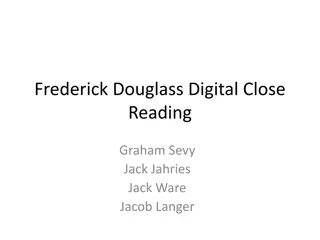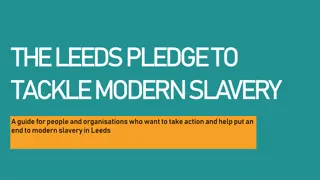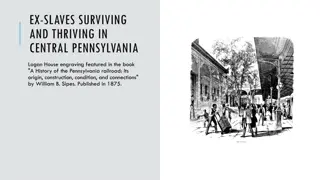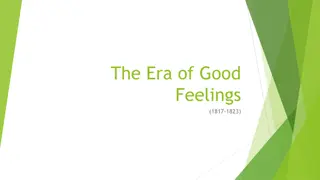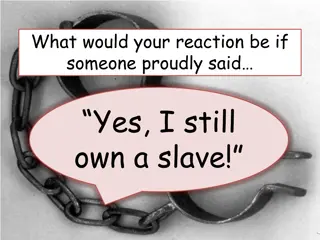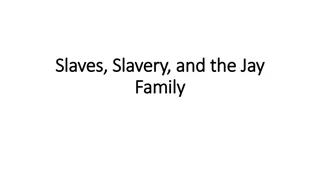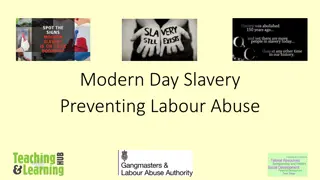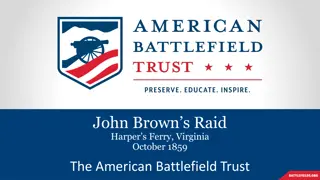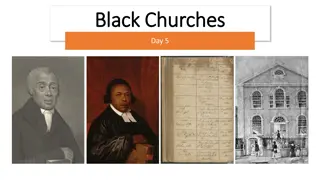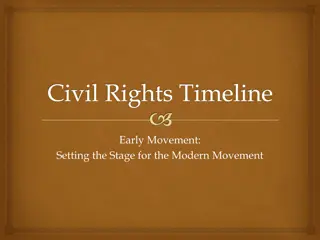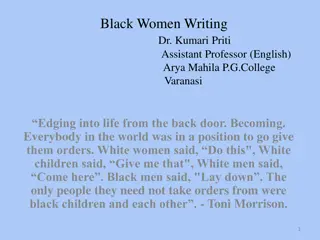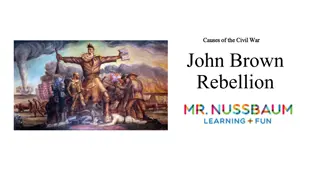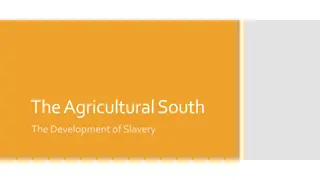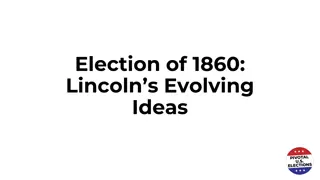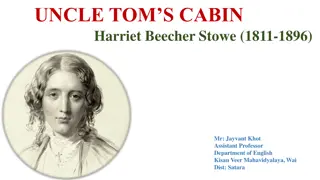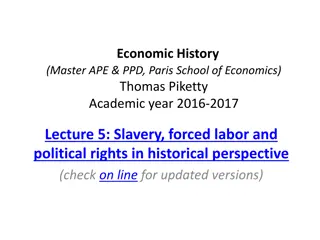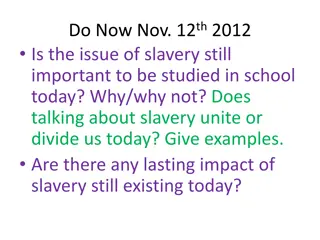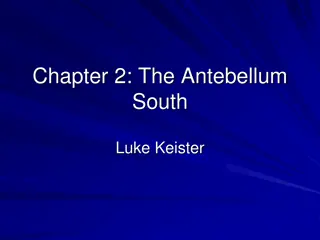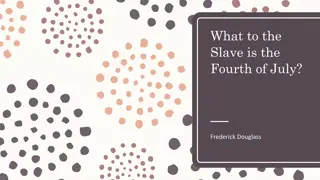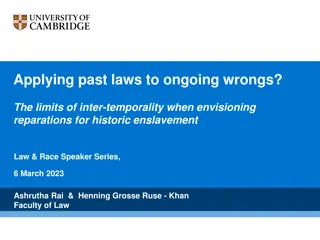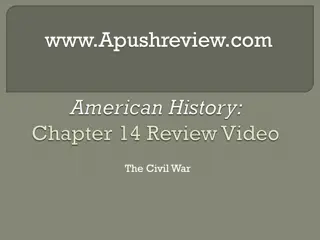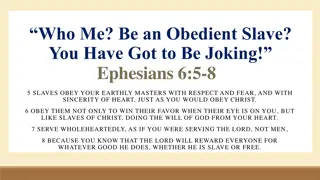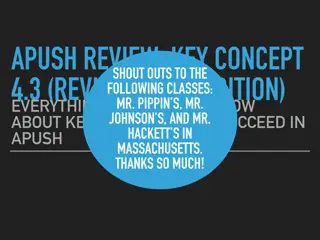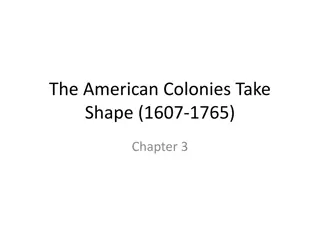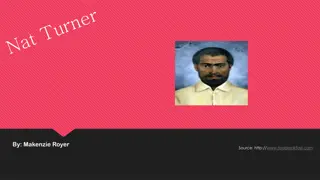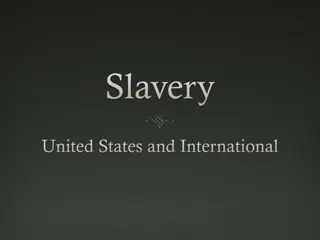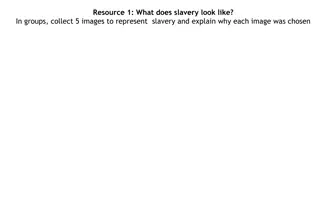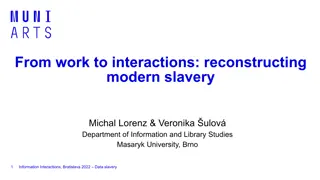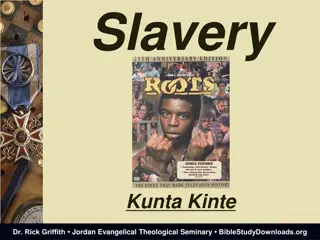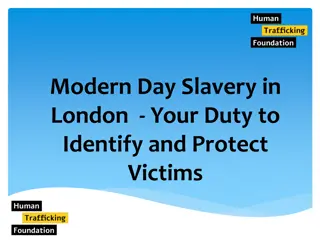Reflections on Slavery: Frederick Douglass's Inner Turmoil
Within close proximity to the Chesapeake Bay, Frederick Douglass experiences a profound internal conflict while observing ships - symbols of freedom to some, but haunting ghosts to him. His longing for freedom, juxtaposed with the realities of his enslaved existence, is vividly portrayed through his
0 views • 16 slides
Guide to Tackling Modern Slavery in Leeds
The Leeds Pledge to Tackle Modern Slavery offers a comprehensive guide for individuals and organizations in Leeds to combat modern slavery effectively. Launched on Anti-Slavery Day, this guide covers key sections like Recognize, Report, Support, Prevent, and Raise Awareness, providing information, r
0 views • 33 slides
History of Slavery in Central Pennsylvania and the Stories of Ex-Slaves
Explore the history of slavery in Pennsylvania and central PA, including the loss of voting rights for black men, the origins of former slaves in the region, their journey to central PA, involvement in the Civil War, occupational pursuits, participation in politics, entertainment activities, and sup
1 views • 29 slides
Understanding Toni Morrison's Beloved: An Exploration of Slavery's Legacy
Beloved, a novel by Toni Morrison, delves into the repercussions of slavery through the haunting tale of Sethe, a former slave who grapples with her past and motherhood. Set in post-Civil War America, the story intertwines themes of love, family, and self-possession in a poignant narrative that ques
0 views • 12 slides
The Era of Good Feelings and Westward Expansion in Early 19th Century America
The Era of Good Feelings (1817-1823) marked a period of national unity and political agreement in the United States, leading to a focus on expansion and development. This era saw significant diplomatic achievements and a surge in westward migration, particularly to areas like the Old Northwest and O
0 views • 19 slides
The Journey to Abolishing Slavery: Understanding William Wilberforce & the Movement
Discover the historical context of slavery, the pivotal role of William Wilberforce, and the reasons behind Britain's decision to abolish the slave trade in 1807. Explore key events, debates, and societal shifts that led to the abolition movement, shedding light on the complexities and motivations i
0 views • 9 slides
Exploring Slaves, Slavery, and the Jay Family History
Delve into the historical narrative surrounding slaves, slavery, and the Jay family in this informative collection. The images depict various aspects of this historical context, offering a glimpse into the past and shedding light on significant events and relationships. Learn about the intricacies o
0 views • 9 slides
Understanding Modern Day Slavery and Labor Exploitation
Explore the concept of modern slavery, its various forms, how it operates, signs to recognize, and where it can be found. Delve into the impact on individuals and society, and learn about initiatives like the GLAA's efforts to combat such abuses.
3 views • 13 slides
The Impact of John Brown's Raid on Harper's Ferry in 1859
John Brown's raid on Harper's Ferry in 1859 was an attempt to incite a slave rebellion and abolish slavery. Brown believed in the righteousness of his cause, but his actions sparked national debate and differing reactions. While some saw him as a martyr for freedom, others viewed him as a radical ex
2 views • 9 slides
Exploring the Legacy of Black Church Leaders in Fighting Slavery
Explore the pivotal role of Black church leaders in providing protection during the fight against slavery. Delve into the communities and organizations they emerged from, emphasizing the importance of the Black church to the population. Discover influential figures like Richard Allen and Absalom Jon
0 views • 12 slides
Early Civil Rights Movement: Abolition, Legislation, and Freedom
Abolitionist groups form to fight against slavery in 1775, leading to the establishment of the Pennsylvania Society for Promoting the Abolition of Slavery. Legislation such as the Slave Trade Act of 1794 and the outlawing of slavery by different states played a crucial role in the early civil rights
0 views • 58 slides
Struggles of Black Women Against Racism and Oppression in America
The institutionalization of black slavery in America created a deep divide between whites and blacks. Racism ingrained in American history perpetuated the belief of black inferiority. Despite racial discrimination, black communities formed a strong identity post-abolition. Black women faced intense
0 views • 18 slides
Understanding the History of Slavery: Activities and Insights
Explore the historical context of slavery through various activities like mind mapping life in Africa, understanding European trade, depicting reasons for Africans chosen for slavery, learning about slave trading events, and delving into the experiences at Elmina Castle. Engage with visual content a
2 views • 12 slides
The Epic Journey of Moses: From Slavery to Freedom
Moses, a royal baby adopted by Pharaoh's daughter, emerges as an epic hero leading the Israelites from slavery in Egypt to the promised land of Canaan. Guided by divine intervention, he unleashes plagues upon Egypt, persuades Pharaoh to release his people, and miraculously parts the Red Sea. The Isr
1 views • 8 slides
John Brown's Role in Escalating Tensions Towards the Civil War
Explore John Brown's pivotal role in the lead-up to the Civil War through his radical abolitionist actions, including the violent events in Bleeding Kansas and his infamous raid on Harper's Ferry. Brown's staunch anti-slavery stance and militant tactics further polarized the nation on the issue of s
0 views • 9 slides
Supporters of Slavery in the 19th Century: Legal, Religious, and Economic Arguments
In the 19th century, defenders of slavery utilized legal arguments by denying citizenship rights to blacks, religious arguments by justifying ownership and guidance through biblical references, and economic arguments by comparing treatment of slaves in the South to conditions of workers in the North
0 views • 4 slides
Impact of the Thirteenth, Fourteenth, and Fifteenth Amendments in the United States
The Thirteenth Amendment abolished slavery, the Fourteenth granted citizenship and equal protection under the law to all persons, and the Fifteenth protected voting rights regardless of race. These amendments reshaped American society by ending slavery, ensuring equal rights for former slaves, and p
0 views • 29 slides
Development of Slavery and Cotton Economy in the Agricultural South
The development of slavery and the rise of the cotton industry in the Agricultural South played a crucial role in shaping the region's economy and society. From the introduction of crops like tobacco, rice, and indigo to the emergence of cotton as a dominant crop supported by innovations such as the
0 views • 20 slides
Understanding Spiritual Freedom and Slavery Through Galatians
Explore the concepts of spiritual freedom and slavery as depicted in Galatians 4:8-31. The text delves into knowing God, being zealous for Him, and the contrast between bondage and freedom exemplified by Ishmael and Isaac. Reflect on the significance of reliance on Christ for true freedom.
0 views • 14 slides
Election of 1860: Lincoln's Changing Views on Slavery and Federal Authority
The election of 1860 marked a turning point, leading to secession of states and the start of the Civil War. Abraham Lincoln initially pursued a moderate stance on slavery to keep states in the Union. His evolving ideas on liberty, equality, and government are reflected in his speeches. The outcome s
0 views • 10 slides
Uncle Tom's Cabin: Overview of Harriet Beecher Stowe's Abolitionist Novel
Harriet Beecher Stowe, an American abolitionist and author, penned "Uncle Tom's Cabin" to vividly portray the experience of slavery. The novel revolves around Uncle Tom, a dignified slave, and exposes the harsh realities of slavery in the 19th century America. It gained immense popularity, especiall
0 views • 55 slides
Historical Perspective on Slavery: Impact and Relevance
Explore the historical context of slavery, from Ancient Greece and Rome to the pre-1860 Southern US, and its long-term implications on societies. Delve into the debates on compensation, racial discrimination, and the comparison with debt and serfdom, shedding light on the continuum between slavery a
0 views • 51 slides
Relevance of Studying Slavery in Modern Education
The issue of slavery remains significant in modern education as it explores its impact on society, unity, and division. Discussing slavery can both unite and divide us today, with lasting impacts evident in various aspects of society. The historical context, including events like Nat Turner's Rebell
0 views • 17 slides
The Antebellum South: Economic Disparities and Slavery's Role
The economic disparities between the North and South in the antebellum period are highlighted, with the South lagging in modernization, education, and industrial development. Slavery became a crucial aspect of the Southern economy, particularly in the cotton industry where slaves were essential due
0 views • 19 slides
Frederick Douglass: What to the Slave is the Fourth of July?
Frederick Douglass delivers a poignant speech on the Fourth of July, exposing the hypocrisy of America celebrating freedom while denying it to slaves. He challenges the nation to confront the injustices of slavery and calls for true equality and justice. Despite the grim reality he presents, Douglas
0 views • 4 slides
Examining Reparations for Historic Enslavement: Inter-temporal Challenges
The Law & Race Speaker Series on applying past laws to ongoing wrongs explores the complexities of seeking reparations for historic enslavement. The discussion delves into the inter-temporal considerations, touching on reparation claims by CARICOM, the impact of transatlantic chattel slavery on glob
0 views • 27 slides
Abraham Lincoln and the Election of 1860
Abraham Lincoln, a self-educated Illinois frontiersman, entered national politics through debates against Stephen Douglas in 1858. The 1860 Democratic Convention faced division over slavery issues, leading to the emergence of multiple candidates. The Republican Convention strategically nominated Abr
0 views • 9 slides
The Civil War: Causes, Advantages, and Impact
The American Civil War was ignited by South Carolina's secession in 1860, leading to conflict over slavery and states' rights. President Lincoln fought to preserve the Union, not abolish slavery. The war saw economic developments like the Homestead Act and Morrill Land Grant, along with increased ta
0 views • 11 slides
Understanding Slavery in Biblical Context: A Different Perspective
Exploring the nuances of slavery as depicted in the Bible, this content delves into the context of slavery in ancient times, contrasting it with the more widely known American slavery. It highlights the mutual submission between masters and slaves, emphasizing the importance of good actions and atti
0 views • 22 slides
APUSH Key Concept 4.3 Review: U.S. Foreign Policy and Expansion
The U.S.'s interest in foreign trade and expanding national borders influenced its foreign policy. Initiatives like the Monroe Doctrine and westward expansion led to conflicts over slavery, plantation slavery spread westward, and antislavery efforts increased in the North.
0 views • 8 slides
Safeguarding Forum on Modern Day Slavery in Newham - May 6th, 2022
The Safeguarding Forum scheduled for May 6th, 2022, in Newham focuses on modern-day slavery, featuring discussions on strategies, action plans, and a zero-tolerance approach. The event includes insights from key speakers, updates on education safeguarding, and pathways for help and support for child
0 views • 30 slides
Understanding Modern Slavery Awareness for Private Landlords
Modern slavery awareness is crucial for private landlords to identify and combat various forms of exploitation such as forced labor, human trafficking, and domestic servitude that victims may endure. This article discusses the signs, risks, and legal implications associated with modern slavery in pr
0 views • 7 slides
Immigration and Slavery in the American Colonies (1607-1765)
The American colonies experienced significant immigration, with English, Irish, and German settlers seeking a new beginning. Many English immigrants were indentured servants, while Irish and German immigrants faced push factors like war and religious persecution. Additionally, the slave trade played
0 views • 42 slides
The Story of Nat Turner: From Childhood to Rebellion
Born in 1800, Nat Turner experienced a traumatic childhood marked by slavery and visions from God. Raised in a religious family, he had a deep-seated hatred for slavery. Turner's rebellion in 1831 led to the deaths of many, as he sought to overthrow the oppressive system. His army of 70 slaves wreak
0 views • 16 slides
History of Slavery in the United States and Internationally
Slavery in the United States and internationally has a complex history, starting in the colonies with indentured servants and evolving into harsh chattel slavery. The Triangle Trade enriched Europeans at the expense of enslaved Africans, leading to a brutal system that destroyed families and culture
0 views • 8 slides
Exploring Modern Slavery Through Case Studies
This collection of case studies delves into modern forms of slavery, highlighting efforts to combat exploitation and abuse in different regions and sectors. From Brazil's innovative anti-slavery system to the struggles and successes of indigenous communities and worker coalitions, these narratives s
0 views • 6 slides
Unraveling Modern Slavery in Data Interactions
Explore the concept of data slavery through ethical concerns, research objectives, methodology, and the impact on society. Discover the various terms associated with data slavery and its ethical implications in the digital age.
0 views • 11 slides
Addressing Modern Slavery and Climate Change Risks in Public Sector Supply Chains
The presentation by Dr. Kyle Alves highlights the pressing need to recognize the intersection of modern slavery and climate change in supply chains. Findings reveal a lack of awareness and executive support in mitigating these risks, urging a clear mandate, active risk management mechanisms, and coh
0 views • 7 slides
Understanding the History and Impact of Slavery in Ancient Societies
Delve into the origins, forms, and implications of slavery in ancient societies, exploring diverse aspects such as treatment of slaves, legal frameworks, and philosophical perspectives. Discover how slavery shaped social structures and human perceptions throughout history.
0 views • 56 slides
Understanding and Combatting Modern Slavery in London
Modern slavery, including human trafficking, servitude, and forced labor, is a harsh reality. The Human Trafficking Foundation in London plays a crucial role in raising awareness and providing support to combat this issue. It's vital to identify victims and offer protection to those who are coerced
0 views • 18 slides
